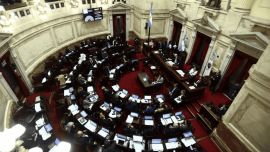THE WEEK IN CORONAVIRUS
At press time yesterday there was a total of 392,009 confirmed cases of coronavirus and 8,271 deaths, as compared to 329,043 cases and 6,730 deaths the previous Friday. In the first half of the week a flatter contagion curve in Greater Buenos Aires (sustained throughout the month in the FederaI Capital) raised hopes but these faded in midweek when confirmed coronavirus cases nationwide entered into five digits for the first time. On Tuesday the national and provincial ministries agreed that no schoolchildren would repeat this year due to the interruption of classes by the pandemic but the next day the Education Ministry nixed the City Hall initiative to allow thousands of children without access to Internet to return to classrooms. On Thursday the City Legislature approved a bill to allow the dying to be accompanied by a family member, while President Alberto Fernández held a lengthy videoconference meeting with provincial governors. On Friday, the Peronist leader announced – for the first time not with a press conference – Argentina’s next steps.
JUDICIAL REFORM CLEARS SENATE
The government’s judicial reform cleared the Senate in the first minutes of yesterday by a 40-26 vote along strict party lines after a nine-hour debate and now faces an uphill battle in the Chamber of Deputies. At the last minute the reform bill dropped its most controversial amendment, the clause inserted by Neuquén Senator Oscar Parrilli obliging judges to denounce “media pressures. A united opposition (with even moderate City Mayor Horacio Rodríguez Larreta joining criticism of the reform during the week) was joined by a protest demonstration outside Congress on the day. On Tuesday the bill’s critics had a surprising recruit – Vice-President Cristina Fernández de Kirchner (widely believed to be the driving force behind the move), who tweeted that this judicial reform was “neither genuine … nor integral.”
WEALTH ‘TAX’ BILL
The bill to slap a surcharge of 2 to 3.5 percent on fortunes exceeding 200 million pesos was finally submitted to Congress yesterday after the concept was first floated in April by Frente de Todos deputies Máximo Kirchner and Carlos Heller. The government is hoping to net over 300 billion pesos with this levy, which is technically not a tax. The surcharge is progressive with the top rate starting at three billion pesos – 20 percent of the proceeds are earmarked to combat the coronavirus pandemic while the rest will be reserved for wage assistance, scholarships and shantytown subsidies. The Economy Ministry reportedly delayed submission by initially expressing doubts while business chambers have continually rejected the idea as “highly negative for investors. On Monday Congress ratified Decree 690/2020 from three days previously freezing mobile television, Internet and cable television charges for the rest of the year and declaring telecommunications a public service.
EYE ON MARKETS
As the deadline for the government’s bond swap offer expired yesterday, the official Banco Nación exchange rates remained unchanged from 78 pesos per dollar from the previous Friday while the parallel “blue” dollar dipped from 138 to 136 pesos. Country risk was volatile, topping 2,100 points at times yesterday from 2,056 points the previous Friday, despite the optimism based on prior acceptance of the bond swap by the main bondholder groups. On Wednesday the government formally initiated negotiations with the International Monetary Fund over the US$44 billion owed the IMF.
WHERE IS FACUNDO?
At press time yesterday there was still no clear identification of the remains found in southern Buenos Aires Province two weekends ago as belonging to the missing youth Facundo Astudillo Castro (who would have turned 23 last Sunday). His mother Cristina Castro, encouraged by a sympathetic audience with President Alberto Fernández on Monday and convinced that the remains are her son’s, criticised Buenos Aires Province Security Minister Sergio Berni throughout the week, calling for his resignation or dismissal by Governor Axel Kicillof.
ALBERTO RUFFLES FEATHERS
President Alberto Fernández ruffled feathers more than once last week, saying over the weekend that Argentina had suffered less from the coronavirus pandemic than from his predecessor Mauricio Macri’s presidency, while on Tuesday he turned down a request from the Anti-Corruption Office to divulge the clients of his pre-presidential legal practice and resign his university chair, pleading confidentiality to justify the former refusal. For his part Macri denied from Switzerland that he had ever said: “Let those who have to die die,” as claimed by Fernández.
DUHALDE DOOM
Ex-president Eduardo Duhalde forecast doom and gloom in the near future, ruling out next year’s midterms and anticipating a coup d’état as the result of Argentina heading towards "a scenario worse than 2001." As Duhalde told a Monday evening television programme, "nobody can ignore that militarism is making a comeback throughout Latin America," giving Brazil, Bolivia and Peru as examples. Duhalde’s statements were promptly rejected by Defence Minister Agustín Rossi as "an impossible scenario," asserting: "The Armed Forces are absolutely integrated into the democratic system, perhaps more than any force on the continent." The ex-president’s dire prophesy was repudiated by not only government spokesmen such as Rossi and Cabinet Chief Santiago Cafiero but also the military high command and a broad opposition spectrum ranging from at least two deputies of the Juntos por el Cambio centre-right opposition to the far left, as well as Grandmothers of Plaza de Mayo leader Estela Barnes de Carlotto.
URUGUAYAN ADMITS DICTATORSHIP MURDERS
Retired Uruguayan Colonel Gilberto Vázquez, 75, jailed for crimes against humanity during the country’s 1973-85 dictatorship, admitted that he had also killed and tortured on the other side of the River Plate, according to material from his 2006 court-martial released yesterday. He further confirmed at least one clandestine flight to dump political prisoners into the estuary. “I had to kill and torture so I did – it costs me sleep but I don’t repent,” was the ex-officer’s comment, calling the slayings “executions, not murders” and concluding: "There was no other way to fight and I’m proud of what I did.” Vázquez now faces possible extradition to Argentina.
EU-MERCOSUR DEAL OFF?
Brazilian Vice-President Hamilton Mourao said on Thursday that Mercosur’s regional problems, especially “the continuous crisis in our great trade partner, Argentina,” were complicating the free trade agreement with the European Union, signed last year after two decades of negotiations. Mourao criticised Argentina for delaying Brazilian imports, including US$100 million worth of cars. The retired general also rubbished EU environmental objections to Amazon deforestation as motivated by the European inability to compete with Brazilian agriculture.
BOLIVIAN ‘INTERFERENCE’
Bolivia’s Supreme Electoral Court on Wednesday complained about the "interference" of Public Works Undersecretary Edgardo Depetri (a former deputy and picket leader) after the official promised exiled Bolivian ex-president Evo Morales that he would promote the participation of his compatriots living in Argentina in the Bolivian elections set for October 18 so that “Bolivia can again become a free and democratic country.” Around 166,000 Bolivians resident in Argentina are registered to vote.
USE YOUR ILLUSION
Hundreds of Newell's Old Boys fans organised on Thursday a boisterous motorcade under the slogan 'Your dream, our illusion' for the return of football superstar Lionel Messi, estranged from the Barcelona where he has shone for the last two decades, to the club of his childhood. "But you have to be realistic, it’s complicated," commented Newell’s striker Ignacio Scocco. Some of the Messi family fortune is invested in Rosario real estate.
RAGING FIRES
Raging wildfires in forests and grasslands are burning out of control in northern and central Argentina, with outbreaks in at least a dozen provinces. The Paraná Delta is experiencing its worst week since the beginning of the year, with fires stretching over hundreds of kilometres of grassland and wetland. Fires have also been seen in the north and centre of the country, with officials in Córdoba Province on Monday reporting evacuations and an "extreme risk" of further outbreaks in the coming days thanks to dry and windy weather. According to Reuters, at least 14,321 hectares (55 square miles) of grasslands and mountainous territory have so far been burned, mainly in the northern areas of Punilla and Ischilín. Meanwhile, in the province of Santa Fe, 6,235 separate outbreaks have been registered over the last week, officials said. The fires in the Paraná fires are the worst in about a decade and have sparked concern among experts about the environmental impact of the disaster. Since January there have been more than 25,000 outbreaks in the system of islands and streams that make up the rich region of biodiversity, according to reports, with the Paraná River at its lowest level in more than 60 years, enabling wildfires to rage quicker than ever.



















Comments